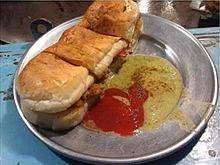Bun kebab: Difference between revisions
BunKaKebab (talk | contribs) No edit summary Tag: Reverted |
BunKaKebab (talk | contribs) No edit summary Tag: Reverted |
||
| Line 6: | Line 6: | ||
| caption = A typical Bun Kebab with ketchup and chutney |
| caption = A typical Bun Kebab with ketchup and chutney |
||
| country = [[India]] |
| country = [[India]] |
||
| region = [[Bhopal |
| region = [[Bhopal]]<ref name = 'Sadaf' /><ref name = 'Outlook' /> |
||
| national_cuisine = [[Indian cuisine|Indian]] |
| national_cuisine = [[Indian cuisine|Indian]] |
||
| creator = |
| creator = |
||
Revision as of 11:11, 26 June 2024
This article needs additional citations for verification. (November 2015) |
 A typical Bun Kebab with ketchup and chutney | |
| Course | Main course |
|---|---|
| Place of origin | India |
| Region or state | Bhopal[1][2] |
| Associated cuisine | Indian |
| Serving temperature | Hot |
| Main ingredients | Buns, shami kebab, eggs, vegetables |

Bun kebab (Template:Lang-hi, Template:Lang-ur) or anda shami (Template:Lang-hi, Template:Lang-ur) is a sandwich that originated in Bhopal,[2][1] in the Indian state of Madhya Pradesh, but is now popular all throughout the Indian subcontinent. In India, it is eaten as a regular street food, specifically, in the Indian cities of Bhopal, Lucknow, and Hyderabad; it is especially popular with Indian Muslims, the dish is eaten late-night during Ramadan. Bun kebabs are usually sold from roadside stalls, side street vendors, and fast food restaurants.[3] They are also commonly known as anday wala burger.[4] Bun kebabs are now also a signature in Pakistani metro cities like Karachi and Lahore, but they can be found all over Pakistan.[5] Bun Kebab vendors are scattered all across Karachi, vendors on Burns Road being particularly famous,[6] and imitated by frozen bun kebabs sold in South Asian supermarkets across the world.[7] A ‘fried’ version of the bun kebab is popular in Lahore, known as ‘bun plaster’ due to copious amounts of butter and super tender or paste-like kebab mixture used in it. Bun kebabs are usually eaten as a main course or snack.[5]
Ingredients
A bun kebab consists of a shallow-fried spicy patty called shami kebab, onions, and chutney. The chutney is made up from tamarind (imli), salt, cumin powder, whole red chillies, and/or raita in a bun. The bun is grilled on the pan.
Bun kebab patties are typically composed of ground beef or mutton, ground lentils, powdered cumin seeds, and an egg batter. Although they can be vegetarian. The patties are fried in ghee or oil. A bun kebab can also be served with a fried egg or omelette[3] and topped with tomatoes, cucumbers, or onions.[5]
Variations
The patty, shami kebab, can be made of chicken, beef, mutton, potato (aloo wala), egg (anday wala), or lentil (daal).[5] The beef and egg recipe is the most popular, especially among street vendors.
See also
- Indian cuisine
- Awadhi cuisine
- Hyderabadi cuisine
- Pakistani cuisine
- Fastfood
- Kebab
- List of sandwiches
- List of buns
- Vada pav
References
- ^ a b Hussain, Sadaf (August 25, 2019). Daastan-e-Dastarkhan: Stories and Recipes from Muslim Kitchens. Hachette India. p. 282. ISBN 9789388322423.
- ^ a b Outlook Traveller: Madhya Pradesh. Vol. 8. Outlook Publishing. April 2008. p. 85.
- ^ a b OA (2015-04-05). "The battle of cuisines: Bun kebab vs burger". DAWN.COM. Retrieved 2019-01-12.
- ^ Zubair, Saad (2017-12-03). "11 Of The Best Bun Kababs For The Ultimate Street Food Experience In Karachi". MangoBaaz. Retrieved 2019-01-12.
- ^ a b c d Narwani, Deepa. "Street food for the soul". Khaleej Times. Retrieved 2019-01-12.
- ^ Aftab, Tehniat (2010-06-08). "The Street Favourite: Bun Kebabs". The Express Tribune. Retrieved 2023-05-28.
- ^ "Karachi Delight Bun Kabab". HalalWorldDepot. Retrieved 2023-05-28.
